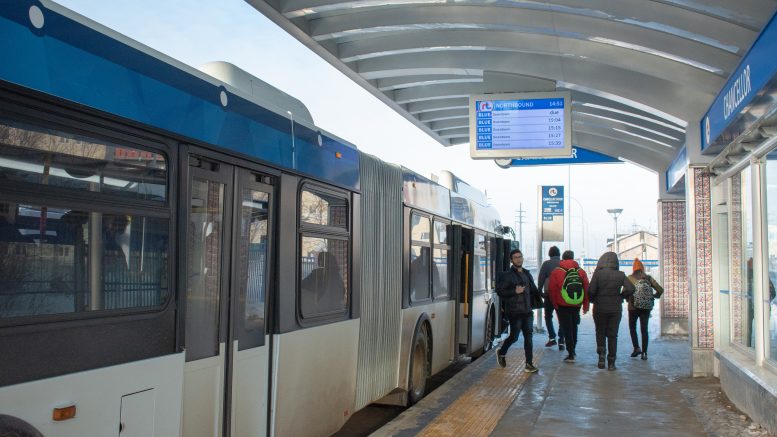With exam season on the horizon, some students could be left without a reliable way to get to campus in the near future. Winnipeg’s transit union has set a strike deadline of Dec. 11, which may take effect if ongoing contract negotiations with the City of Winnipeg do not produce a deal.
Amalgamated Transit Union Local (ATU) 1505 has been without a contract since January. Since then, the city has proposed two tentative agreements, but both have been rejected by union members.
Students in the master of human rights program Avery Selby-Lyons and Imtiaz Mahmud both support the labour action of ATU 1505 workers but are concerned about how they will get to campus.
“I don’t know how I would get to school otherwise,” said Selby-Lyons.
Mahmud said that, given his unfamiliarity with the downtown area and the possibility of increased bus disruptions, he has concerns regarding his safety. The costs of travel are also at the top of both students’ minds.
ATU 1505 president business agent Chris Scott told the Manitoban he apologizes to students for any inconvenience, stating that the possibility of a strike “is not a decision that we take lightly.” Scott said strike action is a “powerful tool” that unions can use to improve the conditions of workers, but it is a “last resort.”
Chief administrative officer for the City of Winnipeg Michael Jack said the effects of a strike would be “widespread.”
“The impacts of a strike would hit every corner of this city and across industries and across demographics,” said Jack.
He said a strike would cause disruptions for the city unlike any in “recent history.”
“The city really is trying to make every reasonable effort it can to avoid that, I would like to believe that the ATU is as well,” said Jack.
Jack said the city will continue working on negotiations every day if that is what it takes to avoid a strike and find a fair deal.
The city has urged ATU 1505 to figure out the “sticking points” with membership and bring them forward so they can reach a “mutually agreeable” deal.
Safety and working conditions are key points of contention for transit operators and the workers who are responsible for maintaining the buses — plant and equipment members.
The main concern for transit operators is unsafe working conditions, including an increase in violence from bus riders. Scott said the issue appears to have been “exacerbated by the pandemic.”
For the plant and equipment members, health concerns include overheating, as the facility lacks air conditioning, and the possibility of asbestos in the garage.
Scott said “a little bit of headway” was made during negotiations on Nov. 30 and both parties continued negotiations throughout the day on Dec. 1.
A press release from ATU 1505 following its rejection of the second deal noted that “compensation is not adequate for the increased risk that the job entails,” and that a lack of improvements to benefits prompted the decision to pursue further labour action.
Scott said that Winnipeg Transit experiences difficulty retaining employees due to their working conditions. Winnipeg Transit relies heavily on overtime to meet effective levels of transit service.
ATU 1505 members have stopped taking on voluntary overtime, leading to scheduling disruptions.
The union claims Winnipeg Transit needs a five per cent increase in transit operators to return to pre-pandemic levels.
Vice-provost students Laurie Schnarr said whether or not a strike occurs on Dec. 11, the fall exam season will go ahead as planned. She stated that students have had “ample notice” to make travel arrangements.
Schnarr noted that the issue is on the administration’s agenda for an upcoming meeting with UMSU. She said that any updates regarding bus disruptions or a strike will be communicated to students.
Schnarr said she has reached out to UMSU and proposed they create a “carpool initiative” to support students with no alternative travel options, though she has not yet received a response.



